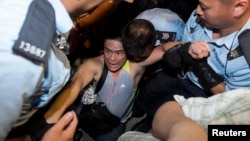Police in Hong Kong arrested more than 500 protesters from an overnight sit-in early Wednesday that followed a massive pro-democracy rally.
The protesters were charged with illegal assembly and obstructing police after vowing to stay in the city's financial district until 8:00 a.m.
Most protesters did not put up a struggle. Others had to be dragged away, kicking and screaming, from the Chater Road protest site.
Mabel Au with Amnesty International calls the mass arrests "disturbing," told VOA the protesters were not doing anything illegal.
"We didn't see any violence or any kind of riots or anything. It was a very peaceful assembly. We do not agree with police that this was an illegal assembly," said Au.
Au also said it was "unacceptable" that many of those detained have not been allowed to see their lawyers.
Organizers said 510,000 people attended the protest on the 17th anniversary of the former British colony's return to Chinese governance.
Police put the figure at just under 100,000.
The annual protest took on added significance this year amid a campaign to pressure Beijing to allow Hong Kong residents to elect their leader.
Many of the protesters chanted anti-China slogans and carried signs demanding "real democracy" as they marched from Victoria Park to the financial district.
The protest follows an unofficial referendum in which nearly 800,000 Hong Kong residents voted to be allowed more control over the nomination of candidates in a 2017 election.
Beijing says it will fulfill its promise to allow the semi-autonomous territory to elect its leader in 2017, but insists only mainland-approved candidates can run.
Chinese state media on Wednesday quoted mainland officials as saying Tuesday's protest shows the civil and political rights of Hong Kong residents are respected.
But Zhang Xiaoming, Beijing's top official in Hong Kong, said any decision concerning the 2017 election would not be affected by the size of the protest or the referendum.
Mass protests have, in the past, convinced Beijing to alter its policies toward Hong Kong. In 2003, half a million people showed up for a pro-democracy protest, prompting China to scrap proposed anti-subversion laws.
But this time Communist Party leaders appear to be standing firm.
The party last month issued a White Paper emphasizing its "comprehensive jurisdiction" over Hong Kong, which it stressed did not enjoy "full autonomy."
Hong Kong residents enjoy more civil and political rights than their counterparts on the mainland due to Beijing's 1997 agreement with Britain.
But discontent with perceived Chinese interference in Hong Kong is rising and a heavy-handed response by the mainland could trigger more protests.
Occupy Central, a coalition of protest groups, has threatened to shut down the city's financial district later this year if its demands for electoral reforms are not met.





